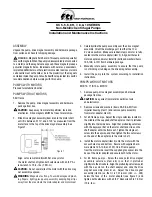
Manual - TC.P Quadro
Control
2016-08-05
72/330
V04.52
3
3.3.2.
Interface hierarchy
In principle, all interfaces have the same priority, i.e. control can be
transferred to another interface at any time.
An exception are the interfaces CANOpen, USB and GPIB.
There is an interface hierarchy during the power-up process. Depending
on which interface was saved previously in the device as “activated”,
control is superimposed via the system state. Settings from an interface
lower in the hierarchy can be overwritten by a interface higher up in the
hierarchy.
3.3.2.1. Interface hierarchy during power-up:
1.
HMI/RCU (optional)
All settings from interfaces lower in the hierarchy are overwritten
by the HMI /RCU interface provided this interface is in the active
state.
In the case of multi-unit systems with several active HMI /RCU
interfaces, the interface that was switched on first takes over the
control.
If several active HMI are switched on at the same time, the se-
lection is random.
The HMI/RCU interface can be set to “passive” such that it does
not make any attempt to take control.
2.
Analogue interface X105
If the HMI is set to “passive” and there is a high level on pin 20,
the analogue interface takes over control.
For further information see chapter 3.3.3, page 73.
3.
RS-232
If the HMI and the analogue interface are not activated, the RS-
232 interface takes over control.
The interface can be selected on the interface using a PC with
the TopControl application. It is also possible to transfer set val-
ues to the TopCon.
4.
CAN/CANOpen (optional)
and USB (optional) as well as GPIB (optional)
If the CAN/CANOpen interface is allocated the function of exclu-
sive control over all interfaces, it is first in the hierarchy.
Exclusive control means that a change in the interface configura-
tion via other interfaces is no longer allowed and the analogue
interface is switched off.
HMI /RCU settings are overwritten.
















































